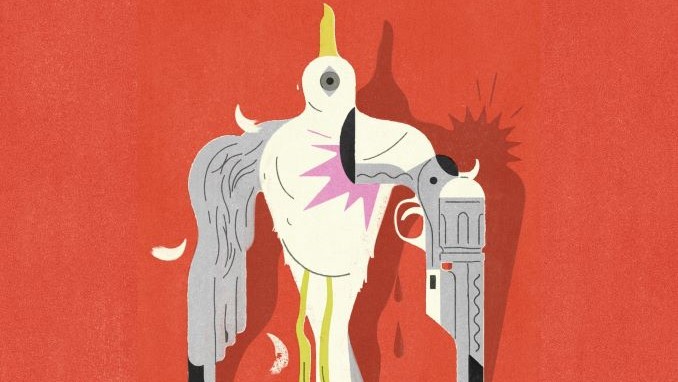Earlier this year, Toronto’s Coal Mine Theatre brought us Yerma, Simon Stone’s excellent modern-day reimagining of Federico García Lorca’s 1934 play of the same name. Alternatingly witty and sorrowful, Stone’s Yerma is the latest in a relatively recent string of theatrical “remakes” – Polly Stenham’s Julie: After Strindberg being another – which borrow a theme and characters from a classic work, but retell it through a wholly modern script informed by wholly modern sensibilities. It’s an approach that seeks to honour the original, without directly tampering with its text.
Judging by Soulpepper’s new production of Anton Chekhov’s The Seagull, that approach must surely be preferable to what playwright Simon Stephens and director Daniel Brooks have attempted in their new “translation” of one of the great stage works of the 19th century. Overwrought and distractingly vulgar, Soulpepper’s Seagull has some decent ideas lurking under its mountain of off-putting choices, but it’s a play that would have been better served by a full-blown modern remake, rather than the mishmash of old and new on display here. If you’ve ever wanted to see a profanity-laced Chekhov production featuring a simulated hand job – replete with cries of, “you’re coming, aren’t you?” – then you’ve come to the right place.

Soulpepper’s Seagull announces its intentions even before the first line of dialogue is uttered. The stage, instead of the original 19th century Russian parlour, is a mostly blank space, decorated with some plastic chairs set before a small stage-within-the-stage (this aspect probably being the most authentic to Chekhov’s original vision). In lieu of a painted backdrop or some other signifier of the rural setting which forms such a significant part of this work, all we get is a small piece of cardboard hanging on the back wall, the word “LAKE” sloppily hand-painted on it.
In fairness, there’s nothing wrong with a production of The Seagull which draws attention to the artificialities of the theatre. Chekhov’s play – which he always insisted was a comedy, even as it is dominated by the repeated firing-off of the proverbial gun – has always been about the stage, about performance. Central characters Kostya and Nina – playwright and muse, respectively – serve as caricatures of the “Passionate Young Artist”-type, while Kostya’s mother Irina, a fading actress whose vanity is matched only by her cruelty, adeptly satirizes every egoist unwilling to admit they are past their prime.
The problem with Soulpepper/Stephens’s version of The Seagull is that it takes those self-aware elements, cranks everything up to eleven, and then grafts on some vulgar humour for good measure. Hence, endless f-bombs and s-bombs, the aforementioned hand job, and, perhaps most annoyingly, a handful of breaking-the-fourth-wall moments that only serve to remind us that Chekhov was never so clumsy.
Speaking of the fourth wall, it’s impossible to tell where or when this version of The Seagull is supposed to take place. On the one hand, Stephens’s translation avoids references to cell phones or other indicators of modernity, notably maintaining Chekhov’s original plot points about coach horses, 19th century medical treatments (quinine, ether), and the outsized role of live theatre in the popular culture of the day. On the other hand, there are all those profanities being hurled about, alongside wildly inconsistent costumes – someone sports a t-shirt of Soviet sci-fi film classic Stalker – and one character who looks and sounds like a Letterkenny/Bob & Doug McKenzie-style hoser.
Incidentally, that “hoser”, estate manager Leo (Randy Hughson), is the one that most clearly demonstrates this production’s fundamental lack of respect, or understanding for, Chekhov’s work. Russian estate managers were not – nor did Chekhov ever portray them as – boorish country yokels, galumphing around in the 19th century equivalent of trucker caps. Heck, Uncle Vanya, the erudite, philosophical protagonist of Chekhov’s masterpiece, was an estate manager. Even in a sea of dubious choices, Hoser Leo stands out in this Seagull, though the blame lies more with playwright and director, than with the actor.
That said, Soulpepper’s The Seagull does have some saving graces, beginning with the performances. In particular, Soulpepper stalwarts Oliver Dennis (Peter) and Diego Matamoros (Hugo) seem to be the only ones aware they’re in a Chekhov play, pitching their performances on the right side of believable and human. Also excellent is Michelle Monteith as the vain actress Irina, whose jealousies of her son Kostya are matched only by her queasy Oedipal behaviour towards him. (Another rare instance of this production honouring Chekhov’s intent.) She is well-matched by Raoul Bhaneja, a familiar face from Canadian film and TV, as her romantic partner, the popular (read: middling) novelist Boris.
I was not, however, convinced by the show’s ostensible leads, Nina (Hailey Gillis) and Konstanin, aka Kostya (Paolo Santalucia). These younger actors habitually overplay their characters’ neuroses, capital-A Acting at such a fever pitch that they – and we, the audience – barely get a chance to breathe.
Santalucia, as Kostya, appears to be doing his best Kieran Culkin-as-Roman Roy impression, all nervous tics and bodily contortions, though he admittedly does a better job of depicting his character’s descent into something approaching madness as the play progresses. I half-expected someone to peer over his typewriter and find “All work and no play make Kostya a dull boy” typed a thousand times over.
Gillis has arguably the tougher job playing the character Nina, a young actress who is variously described as “enchanting”, “poetic”, and “sweet and tender”. Unfortunately, Gillis gets little opportunity to display any of those traits, insteading coming across as one of those irritating theatre dorks who affect weird voices which only they think are funny. Gillis also commits the unforgivable sin of repeatedly mispronouncing Irina as Eye-rina.
It’s especially disappointing that Stephens’s translation is so ham-handed, given that Chekhov, of all writers, has long invited new translations. Unlike many of the other great non-English playwrights, Chekhov has never had one definitive translator or translation, which is why so many theatre companies commission their own. Tom Stoppard has done a Seagull. Screenwriter Christopher Hampton (Dangerous Liaisons, Atonement) has done a Seagull. David Mamet has not done a Seagull, but he’s written superlative translations of Three Sisters, The Cherry Orchard, and a must-see filmed version of Uncle Vanya.
Stephens is a highly acclaimed playwright in his own right – I quite enjoyed his Birdland starring Andrew Scott – and one can certainly see how a fully modernized Seagull, unshackled from Chekhov’s original text, would have been better served by Stephens’s talents. As it is, this hybrid – mostly true to the original, but punctuated by distracting and vulgar additions – is a strange bird indeed.
***
Tickets for The Seagull can be purchased here.
Soulpepper’s 2023 season continues with Athol Fugard’s Sizwe Banzi Is Dead, beginning May 25th.



